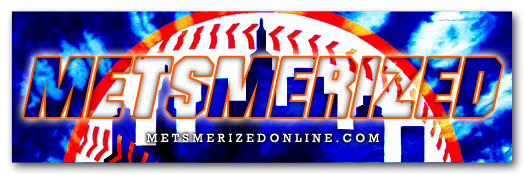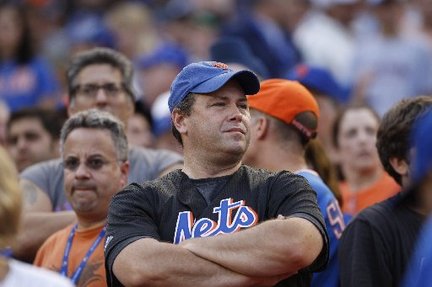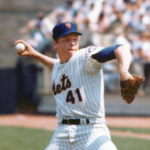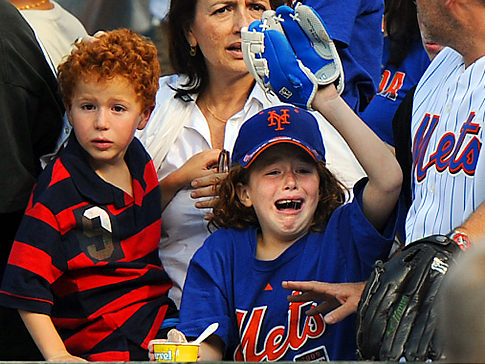
Mets outfielder Curtis Granderson asked a question last week that resulted in quite the tweet-storm:
“I’ve always wanted to know why someone would boo, because in the next second they’ll cheer…So which one is it? You like your team or dislike your team? You call yourself a fan and then you’ll boo?”
“I understand you’re a fan, but at the same time, you aren’t playing…I can see you getting that intense as a player or have played. But if you’re just a fan and watching, enjoy the excitement of the game that is in front of you, win, lose or draw, whatever the case is.”
I can sympathize with Curtis. I’ve often wondered myself why someone would boo their own … it’s like attending your nephew’s birthday party and booing the cheese-dip. I mean I understand, the cheese dip is bad and you’ve had 7 beers, but it was probably like your sister-in-law or something who made it, have a little respect … you know, in front of the kids – it’s a family event for crying out loud.
That’s the thing, the kids. They don’t know what to make of the booing. They mostly are captivated by the spectacle of the crowd and the cheering and people bringing them treats and all the fancy flashing lights and stuff, and yeah there’s a ball game going on too. They don’t need to hear a bunch of drunk bozos cursing and hissing and throwing beer like this is the Roman Coliseum, or Giants Stadium. I’m glad most stadiums have “family sections” now because honestly nothing makes my neck hair bristle like some moron who doesn’t have the sense not to use profanities in front of a bunch of 8 year olds. I understand why people get upset.

So then, that Fred Ward doppelganger Dave Hudgens (seriously are they related?), decides to lash out after being fired with some choice words directed at the fans:
“I really just think guys tried too hard at home. I think the fans are really tough on the guys at home. How can you boo Curtis Granderson? They have no idea how hard this guy works and how he goes about doing his business, doing his job. He gets off to a slow start and they’re booing him? Come on. It’s tougher at home to play than it is on the road, there’s no doubt about it.”
You know, I liked him in “Tremors,” but as Mets hitting coach not so much, and to be fair, Hudgens is a California guy. Expecting him to understand New York Mets fans is like trying to train a turtle to hop a fence.
So then Colllins figures what the hell I may as well pile on:
“Have you ever been booed? Does it feel good? Human nature is, ‘You know what, I don’t want it to happen again.’ So what do you do? You try harder to keep it from happening again. These guys are not robots.
That’s true Terry. A robot starting pitcher who just pitched a great game would not get upset if you brought in a leaky Valverde to make all manner of doo-doo on the mound, but I digress …
In order to understand this we need to consider the nature and history of booing. Booing goes all the way back to Ancient Greece when they’d boo a theatrical play:
“Hey Kosta, Euripides’ last was trite and contrived don’t you think?”
“Indeed Dimitri, platitudinous even, I booed at the end and throughout.”
During Ancient Rome booing reached a new level, where a Gladiator’s life often depended on “winning the crowd.” Boy if this were the case we’d be going through a lot of left fielders these days.
It is interesting that the art of booing goes back to ancient Greece because it is essentially a democratic function, it is a crude vote — a collective expression of disapproval, revulsion even. It communicates your dislike to the puppeteers, directors, actors, athletes, gladiators or what have you, thus hopefully facilitating some change. Whether it be more blood and guts in the Coliseum or more base hits in Queens, booing serves a purpose.
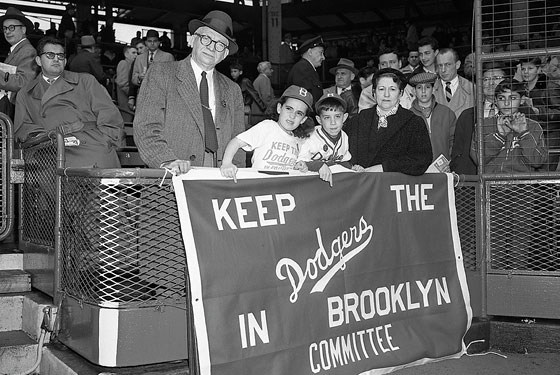
But in order to really understand booing in Queens, you have to go back to May 28th, 1957. On that day MLB Owners voted unanimously to allow the Dodgers and Giants to leave NY. Brooklyn lawyer Walter O’Malley wanted to move his club out west because unlike Brooklyn, the city of L.A. had promised him a new stadium. He wanted to move in spite of his club regularly packing Ebbets field with 32,000 passionate fans and in spite of having won 5 pennants and a World Championship in 8 years. It didn’t matter, by September of that year it was clear to millions of New Yorkers that their hearts would be ripped out, replaced with a fistful of charred newspaper clippings.
New York fans have a history of being duped, bamboozled, lied to. You can’t really understand the discontent in New York’s National League fan base without understanding its unique precursors. Our fathers and grandparents know betrayal, they are wary of it, and they’ve brought us up with our eyes open. Comments like we heard when the Mets traded the franchise Tom Seaver, “penny pinching scoundrels,” “midnight massacre,” and other such invocations of disgust are echoed in today’s reception of our less than perfect National League product (and its architects), with a hefty dose of vitriol reserved for an astonishingly incompetent Ownership.
Discontent is in our genes. We were raised on this venom, we’d pour it into our Cheerios every morning as we’d go over the sports pages. We even seem to revel in it sometimes like a dog rolling around in scat. Think of it this way, you visit your favorite monkey cage at the zoo every day on your lunch break, and every day you show your favorite monkey a banana. You hold it out offering it to him and just as the monkey bounds over eagerly to receive the delicious fruit you pull it back and laugh at the primate, “ha ha ha, stupid monkey.” How long do you think you can do that before the monkey sees you coming and decides to throw a fistful of poop at you? My thinking is, if you don’t have the sense to understand why the monkey would throw poop at you, maybe you shouldn’t be visiting the zoo in the first place.
